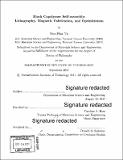Block copolymer self-assembly : lithography, magnetic fabrication, and optimization
Author(s)
Tu, Kun-Hua
DownloadFull printable version (30.24Mb)
Other Contributors
Massachusetts Institute of Technology. Department of Materials Science and Engineering.
Advisor
Caroline A. Ross.
Terms of use
Metadata
Show full item recordAbstract
Block copolymer (BCP) self-assembly is attractive because it provides nanoscale long-range ordered structures in a massive quantity. The capability of generating features with size as low as 5 nm is of particular interest in semiconductor fabrication since current photolithography has reached its resolution limitation and the other competing technologies are either too slow such as e-beam lithography or too expensive such as EUV system. In this thesis, BCP lithography is utilized to fabricate magnetic nanostructure and the corresponding magnetic properties are explored. The polystyrene- b-polydimethylsiloxane (PS-b-PDMS) diblock copolymer with different molecule weight is used to generate various sizes of robust silica pattern after solvent annealing and reactive ion etching. Pattern transfer methods are developed to convert the silica pattern into functional materials, including magnetic materials like cobalt, Co/Pd, FePt and CoFeB magnetic tunnel junctions (MTJ), and MoS2 monolayers. For magnetic nanowire arrays, the interactions between neighboring wires are investigated. For perpendicular MTJ nanopillar arrays, the size-dependent switching behavior and magnetostatic effects between two layers are analyzed. MoS 2 monolayers are patterned into features such as nanodots, nanorods and nanomeshs and the corresponding photoluminescence are characterized. Finally, machine learning and deep learning algorithms are the first-time ever demonstrated to model the BCP self-assembly process. The built model is able to recognize different BCP patterns and predicting the resulting morphology and pattern quality based on experimental process parameters. With this model, the BCP self-assembly can be further optimized toward industrial-grade production.
Description
Thesis: Ph. D., Massachusetts Institute of Technology, Department of Materials Science and Engineering, 2017. Cataloged from PDF version of thesis. Includes bibliographical references.
Date issued
2017Department
Massachusetts Institute of Technology. Department of Materials Science and EngineeringPublisher
Massachusetts Institute of Technology
Keywords
Materials Science and Engineering.